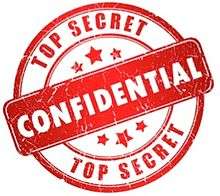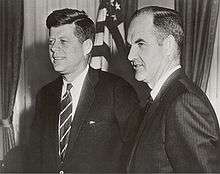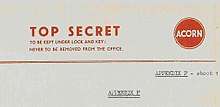.jpg)
Top Secret Cover Sheet

The very word "secrecy" is repugnant in a free and open society; and we are as a people inherently and historically opposed to secret societies, to secret oaths and to secret proceedings. ~John F. Kennedy

From secrecy and deception in high places, come home, America. From military spending so wasteful that it weakens our nation, come home, America... Come home to the affirmation that we have a dream. Come home to the conviction that we can move our country forward. ~George McGovern (Image: John F. Kennedy & George McGovern)

Many of the benefits from keeping Terrorism [or War] fear levels high are obvious. Private corporations suck up massive amounts of Homeland Security cash as long as that fear persists, while government officials...can claim unlimited powers, and operate with unlimited secrecy and no accountability. ~Glenn Greenwald

The secret of freedom lies in educating people, whereas the secret of tyranny is in keeping them ignorant. ~Maximilien Robespierre
Classified information is material that a government body deems to be sensitive information that must be protected. Access is restricted by law or regulation to particular groups of people with the necessary security clearance and need to know, and intentional mishandling of the material can incur criminal penalties. A formal security clearance is required to view or handle classified documents or to access classified data. The clearance process requires a satisfactory background investigation... Although "classified information" refers to the formal categorization and marking of material by level of sensitivity, it has also developed a sense synonymous with "censored" in US English.
Quotes
- The U.S. classification of information system has three classification levels -- Top Secret, Secret, and Confidential -- which are defined in EO 12356.2 Those levels are used both for NSI and atomic energy information (RD and FRD). Section 1.1(a) of EO 12356 states that:
(a) National Security Information (hereinafter "classified information") shall be classified at one of the following three levels:
(1) "Top Secret" shall be applied to information, the unauthorized disclosure of which reasonably could be expected to cause exceptionally grave damage to the national security.
(2) "Secret" shall be applied to information, the unauthorized disclosure of which reasonably could be expected to cause serious damage to the national security.
(3) "Confidential" shall be applied to information, the unauthorized disclosure of which reasonably could be expected to cause damage to the national security.
- The key terms and their definitions are as follows:
- Reasonable--being in agreement with right thinking or right judgment; not conflicting with reason; not absurd; not ridiculous; being or remaining within the bounds of reason; not extreme; not excessive; moderate; not expensive; having the faculty of reason; possessing good sound judgment; well balanced; sensible.
- Could--past tense of can. Can--to be able to do, make, or accomplish.
- Expect--suppose, think, believe; to consider probable or certain; to consider reasonable, just, proper, due, or necessary.
- Cause--a person, thing, fact, or condition that brings about an effect or that produces or calls forth a resultant action or state; something that occasions or effects a result; the necessary antecedent of an effect.
- Exceptional--forming an exception; being out of the ordinary; uncommon, rare.
- Grave--involving or resulting in serious consequences; likely to produce real harm or damage; very serious.
- Damage--loss due to injury; injury or harm to person, property, or reputation; hurt; harm.
- The [U.S.] Inspector General for the Office of the Director of National Intelligence (DNI) has released its annual report on over-classification. Like most reports by government agencies on this subject, it acknowledges certain, minor bureaucratic problems with the way the classification system runs. But the Inspector General found “no instances” of violations of Section 1.7 of the Executive Order governing classification, which states:
- In no case shall information be classified, continue to be maintained as classified, or fail to be declassified in order to:
- conceal violations of law, inefficiency, or administrative error;
- prevent embarrassment to a person, organization, or agency;
- restrain competition; or
- prevent or delay the release of information that does not require protection in the interest of the national security.
- Of course, the intelligence community conceals illegal and embarrassing information all the time. DNI’s position, though, is that this happens only by coincidence... The intelligence community’s claim that it is lawful and proper to censor evidence of torture should alarm us. So should the fact that the intelligence community’s inspector general—the official charged with uncovering evidence of waste, fraud and abuse—cannot find a single example of wrongful classification.
Quotes about
- From secrecy and deception in high places, come home, America.
- From military spending so wasteful that it weakens our nation, come home, America.
- From the entrenchment of special privileges in tax favoritism; from the waste of idle lands to the joy of useful labor; from the prejudice based on race and sex; from the loneliness of the aging poor and the despair of the neglected sick: come home, America.
- Come home to the affirmation that we have a dream. Come home to the conviction that we can move our country forward.
- George McGovern Speech in 1972, quoted in The Genius of McGovern’s ‘Come Home, America’ Vision, The Nation, by John Nichols (19 October 2012)
- Many of the benefits from keeping Terrorism [or War] fear levels high are obvious. Private corporations suck up massive amounts of Homeland Security cash as long as that fear persists, while government officials in the National Security and Surveillance State can claim unlimited powers, and operate with unlimited secrecy and no accountability.
- There is no term more potent in our political discourse and legal landscape than "Terrorism." It shuts down every rational thought process and political debate the minute it is uttered. It justifies torture (we have to get information from the Terrorists); due-process-free-assassinations even of our own citizens (Obama has to kill the Terrorists); and rampant secrecy (the Government can't disclose what it's doing or have courts rule on its legality because the Terrorists will learn of it)...
- Transparency and accountability together are meant to expose wrongdoing and help ensure that there is no impunity of any party involved, whether governments, companies or individuals. But transparency ensured through institutional or legal mechanisms does not always succeed in exposing wrongdoing... That is especially the case when information is... security classified information... The Catch-22, as noted before, is that identifying abuses of secrecy requires access to the very material being kept secret. This access in turn is systematically problematic for parliamentary committees or other independent review bodies.
- Indeed, the ability of organisational insiders to speak up and disclose information in the public interest is at the core democratic values. It seems paradoxical then to punish and prosecute those who actively practice them. The time is ripe to establish a legal framework with clear requirements for protected disclosure that affords a wide protection to individuals who expose wrongdoing in the public interest.
- As I continue to see the reference of leaks repeatedly in the media and the White House Communications Director... pledge to fire the leakers, I began to wonder if a leak was the same thing as a whistle-blower. According to an article written by Wayne Lee of VOA a leak is defined as a voluntary disclosure of classified information. The information is usually provided by an unidentified source whose objective is to make the information public. A whistle-blower, on the other hand, has the right to disclose information to anyone as long as this information is not classified... To make this leak vs. whistle-blower question even more confusing, when you research top whistle-blowers you get a list of whistle-blowers many of whom fall under the leaker classification than the whistle-blower classification because the individuals leaked classified information. So, I am back to my original question; are leakers and whistle-blowers the same? Legally no, but socially maybe they are.
- Forbes: Leaks vs. Whistle-Blowers? That is the Question Kelly Richmond Pope, (27 July 2017)
- In 2010, WikiLeaks posted a graphic [which was at the time, a classified U.S. military] video depicting the killing of perhaps a dozen [unarmed] Iraqis, including two Reuters journalists, at the hands of the U.S. military. The video brought the organization acclaim from civil libertarians and transparency advocates, and infamy within the U.S. military and elsewhere. Soon after its release, WikiLeaks posted its largest-ever cache of leaked material: a set of diplomatic cables and Army documents, many of which concerned the conduct of the wars in Iraq and Afghanistan... The leaks of diplomatic cables and Army documents about the wars in Iraq and Afghanistan followed later that year, cementing WikiLeaks’ place in U.S. history as the conduit for what was then the country’s largest-ever leak of classified information.
- The tension between national security and the public’s right to know was a familiar one dating back well before the famous Pentagon Papers case of the 1970s, when a leaker made public a cache of documents about the U.S. involvement in the Vietnam War.
- The Atlantic: The Radical Evolution of WikiLeaks, Kathy Gilsinan (17 November 2018)
- It should be understood that the government manages a huge, expensive, burdensome system to keep matters classified. All pertinent documents have to be classified, individuals have to have clearances, facilities have to be kept properly for the handling of classified information. One can argue about whether too much information is overclassified. But, this information was not mindlessly classified...
- The FBI's top lawyer in 2016 thought Hillary Clinton and her team should have immediately realized they were mishandling "highly classified" information based on the obviously sensitive nature of the emails' contents sent through her private server.
This article is issued from
Wikiquote.
The text is licensed under Creative
Commons - Attribution - Sharealike.
Additional terms may apply for the media files.